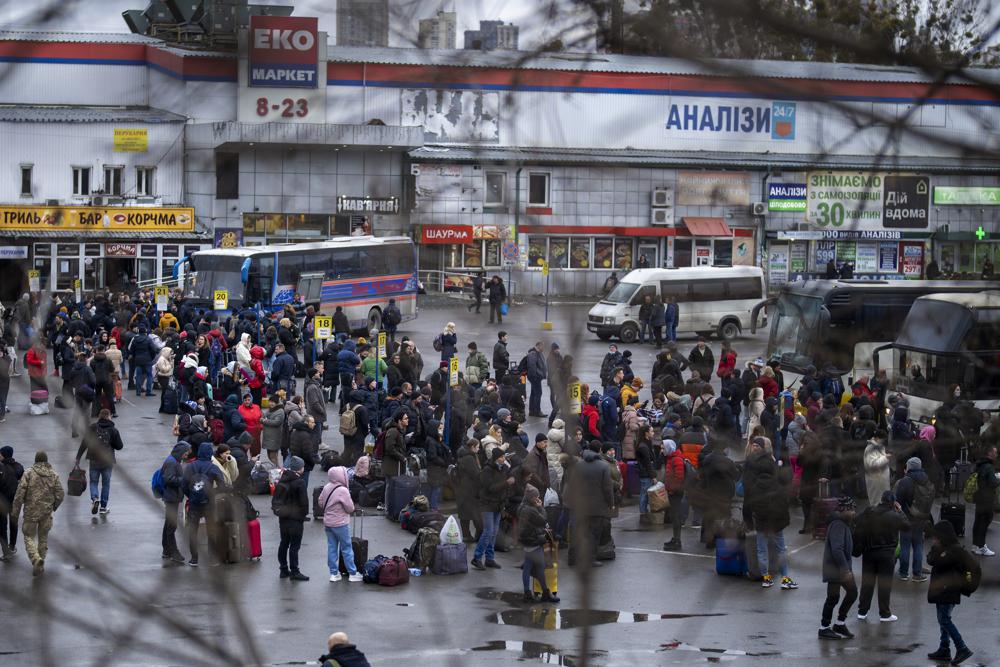ISLAMABAD: Prime Minister Imran Khan "did the right thing" by going ahead with his Russia visit, the Pakistani foreign minister said on Friday, dispelling the notion the visit was ill-timed in view of the Russian invasion of Ukraine.
Prime Minister Khan was in Russia on a two-day official visit on Feb 23-24, during which he held talks with President Vladimir Putin on wide-ranging issues and discussed bilateral relations between Pakistan and Russia.

People try to get onto buses to leave Kyiv, Ukraine, Thursday, Feb. 24, 2022. (AP)
While the Pakistani premier was in Russia, Putin asked Ukrainian armed forces to lay down arms in a televised address before ordering his troops to launch an invasion by land, air and sea on Thursday.
On Friday, Pakistan's foreign minister Shah Mahmood Qureshi said PM Khan met with Pakistani officials and even former diplomats, who had served in Russia, to take their input prior to the Moscow visit.
"We decided to continue with the tour to maximize Pakistan’s diplomatic space," Qureshi said at a press conference on Friday.
"I am completely convinced now after the visit that we did the right thing by going ahead."
Pakistani officials also remained in touch with the United States (US) regarding the visit, according to the Pakistani foreign minister.
A senior US official contacted Islamabad and they were informed that "Pakistan was not part of any superpower club" or bloc, Qureshi said.
"We are not part of any camp politics and neither we have this policy to become part of any particular camp. We have suffered a lot due to this in the past," the foreign minister said.
"We have shifted our policy from geopolitics to geo-economics. We will have good relations with all."
For geo-economics, he said, a natural conclusion for this was to make progress on regional connectivity, Afghanistan and beyond Afghanistan, into the Central Asian republics.
"Then Russia has an historical role in this region," he said. "Russia being onboard will fortify our focus towards geo-economic regional connectivity."
About Pakistanis stranded in Ukraine, the foreign minister said it was the government's priority to ensure their safe and secure evacuation. No Pakistani has died in the conflict so far and reports suggesting otherwise were all rumors, he said.
"We are in contact with our embassy and I talked to them on telephone," Qureshi said. "They were given clear instructions before the trip to Moscow and asked to ensure safety of Pakistani diaspora."
Around 3,000 Pakistanis were currently there in Ukraine, according to the Pakistani foreign minister.
"We have shifted embassy to Ternopil which is close to the Polish border and trying to shift Pakistani students there," he said. "It would be easy to evacuate to Poland from there and then further to Pakistan."
On Thursday, Ambassador Dr. Noel Israel Khokhar told Arab News all Pakistani nationals in Ukraine were safe and the embassy was working on their evacuation.
“On our advice, many Pakistanis had already left the country,” he said. “Only a few students are left behind and we are making arrangements for their safe and secure evacuation from Ukraine.”
“We have asked all students who could not go out of Ukraine to gather at a safe place in Ternopil city [in the western part of the country] and our counselor assistant is also in contact with them,” the envoy added. “We will then work things out from there after assessing the situation.”
Pakistani students, however, said they had been asked by their university officials to leave their apartments and move to underground metro stations to ensure their safety.
“We were living in our apartments but received instructions from our university administration to shift to metro stations,” Maas Hassan, who is enrolled in Kharkiv National Medical University in the Ukraine’s northeast, said.
“No one is listening to us and we appeal to the Pakistani government and Prime Minister Imran Khan to arrange our evacuation on priority.”
“We are around 700 Pakistani students in Kharkiv and about 15 have returned to their country,” Ali Hamza, a first-year medical student from Jhang, said. “All others are still stranded here.”
A Pakistani student Munam Khan said the embassy was not cooperating with the students.
“Our embassy is not cooperating with us at all,” he told Arab News. “A few weeks ago, they told us they would arrange special PIA flights for us if the war broke out, but nothing is being done now.”




















